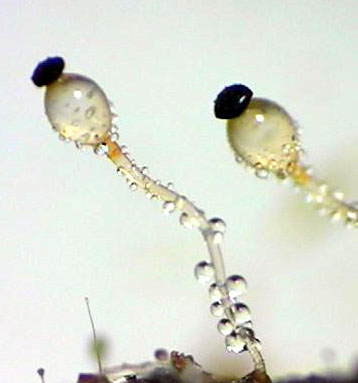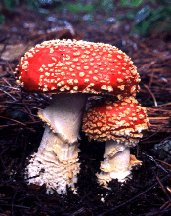BIOLOGY 201
MYCOLOGY
 |
 |
It does not reflect full course policy or practice, and it does not take precedence over syllabi handed out in class.
 |
 |
Mycology is the study of the fungi, which constitute one of the three major kingdoms of eukaryotic organisms (plants and animals being the other two). These simple but important microorganisms are essential components of the economy of nature, and they also play significant roles in human affairs through their actions as agents of disease and decay, as well as through their activities n commercial processes like brewing, antibiotic production, and more.
The course is intended for a broad undergraduate audience, which includes (but is not limited to) second and first-year students who may be taking their first upper-level laboratory course in biology. It is therefore taken into account that some class members may have little experience in cell-level or chemical-level study, and accordingly those aspects of fungal biology that are mainly physiological, biochemical, or cell-biological will be less heavily emphasized than will be others. Nevertheless, the course will cover all aspects of fungal biology with appropriate breadth and rigor.
Sixty percent of your course grade is determined by your performance on
four lecture examinations. There is no cumulative lecture final. The remaining
40% of your grade is determined by your performance in Laboratory. Graded work in Laboratory
includes weekly quizzes, laboratory reports, and a cumulative practical examination.
| Topic 1 | Introduction to the Fungi |
| Topic 2 | The Growing Fungal Cell |
| Topic 3 | Fungal Spores: Escape Capsules for the Genes |
| Topic 4 | Zygomycota and Basic Characteristics of Asexual Reproduction |
| Topic 5 | Zygomycota and Basic Characteristics of Sexual Reproduction |
| Topic 6 | Conidia: Asexual Reproduction among the "Higher" Fungi |
| Topic 7 | Ascomycota: General Characteristics of the Group |
| Topic 8 | Ascomycota: Three Important Plant Pathogens |
| Topic 9 | Basidiomycota: Mushrooms and Puffballs |
| Topic 10 | Basidiomycota: Wheat Rust |
| Topic 11 | Fungal Genetics: Mendelian Inheritance |
| Topic 12 | Fungal Genetics: Molecular Manipulations |
| Topic 13 | Biodeterioration: Degradation of Useful Things |
| Topic 14 | Fungi in the Production of Alcoholic Beverages |
| Topic 15 | Fungi in the Production of Foods |
| Topic 16 | Industrial Mycology: Pharmaceuticals, Enzymes, and Acids |
| Topic 17 | Mycorrhizae: Fungi as Essential Partners of Plants |
| Topic 18 | Fungi as Essential Partners of Insects |
| Topic 19 | Fungi as Predators and Parasites of Invertebrates |
| Topic 20 | Fungal Toxins in Human Health: Mushroom Toxins |
| Topic 21 | Fungal Toxins in Human Health: Toxigenic Molds |
| Topic 22 | Medical Mycology: Classic Pathogens |
| Topic 23 | Medical Mycology: Current Problems |
The dividing line between learning and scholarship is an active engagement with the material. Accordingly, the goal of the Laboratory section in Mycology is to help you develop the skills of observation, identification, and manipulation that are essential to doing research with fungi and other microorganisms, and to working with them in practical applications. In this laboratory you will have an opportunity to learn, among other things, methods for isolating and identifying fungi from nature, basic methods for observing and manipulating fungal growth, and basic methods of genetic analysis. You will also gain experience in using fungi in production of commercial products, specifically foods and alcoholic beverages.
| Topic 1 | Basic Growth and Nutrition of Fungi |
| Topic 2 | Spore Germination |
| Topic 3 | Fungal Genetics |
| Topic 3 | Zygomycota |
| Topic 4 | Conidial Fungi |
| Topic 5 | Ascomycota |
| Topic 6 | Basidiomycota |
| Topic 7 | Yeasts |
| Topic 8 | Food Microbiology: Begin Making Beer |
| Topic 9 | Food Microbiology: Begin Making Tempeh |
| Topic 10 | Food Microbiology: Objective Scholarly Evaluation of Taste Properties of Beer, Cheese, Tempeh, and Mushrooms |